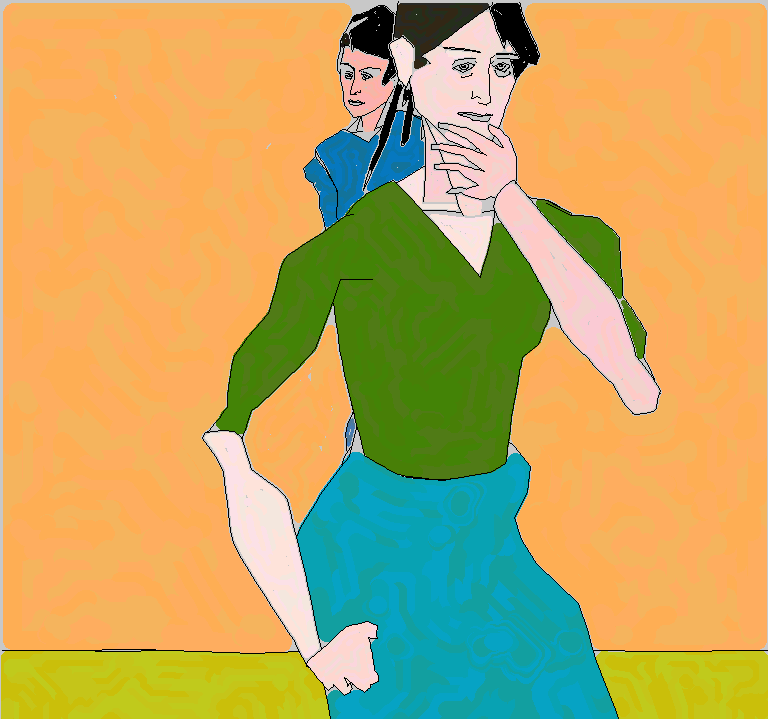Art and Natural Objects
What do you think of this painting? What does it mean to you?
Now that you have an opinion of it, I'll tell you that it was made by a computer program that knows about color and composition and the structure of the human body, but has no knowledge of human emotion: Aaron (McCorduck, 1991). Does knowing this diminish or increase your appreciation of it?
When I talk to people about AIs (artificial intelligences) and art, I typically get a pretty stiff response. Some people claim that computers* cannot make art, either yet or in principle, or that they can't make good art, or that they just would not be happy with any artworks made by computers. Note that this is an informal influence. Formal aspects of a work of art are aspects of the work itself, independent of its history and context. Who made a painting is information related to the art, but seen to be in a different category than, say, where the lines are and what colors are being used.
Unless you're like me and enamored with computers and AI, knowing that a program made the painting above probably diminished your appreciation of it. Usually this is the effect: if a person made it, it's better, and if a person didn't make it, it's worse.
Take a look at this painting:
What do you think?
It was made by an elephant. (http://www.elephantartgallery.com/paintings/9001.php)
I think people go two ways on this. Some people who like the painting will feel cheated-- that the meaning they thought they saw in it is invalid because the painter had no idea what he or she was doing. Others will be fascinated by the idea that an elephant could do this at all, and perhaps appreciate the painting more.
Like my love for computers, I bet a love for animals, in opposition for a love for art, would determine the direction (positive of negative) of knowledge of the painter.
In some cases, though, having some agent make the object could decrease its value to a person. I came across this parable in De Sousa (2004):
THE PARABLE OF THE PEBBLE
Once upon a time, a man walking on the beach found a pebble that looked oddly like a human face. Amazed at this result of millions of years of random friction by stones, sand, and water, the man took it home. He treasured it: often he looked at it, haunted by its accidental beauty. One day, he showed it to a guest who said "Oh, no, I'm sure it's one of Nick's rejects--that hippie sculptor who carves souvenirs for tourists. He sometimes dumps his botched ones back on the beach." Now the pebble was nothing but the charmless reject of a mediocre craftsman. All the strange wondrous beauty the man had so much loved was gone.
* I'm using computers as a shorthand for computer programs, of course.
References
De Sousa, R. (2004). Is art an adaptation? Prospects for an evolutionary perspective on beauty. The Journal of Aesthetics and Art Criticism, 62(2, Special Issue: Art, Mind, and Cognitive Science), 109-118.
Pamela McCorduck (1991). Aaron's Code



Comments
If it's important to people that art be a human artifact, they could try to see the art piece as the whole process of enabling the computer (or elephant for that matter) to make images. There's no reason to feel threatened. A computer is just a new kind of brush.
When a tool makes important artistic decisions, as Aaron does, I think the brush metaphor is no longer apt.